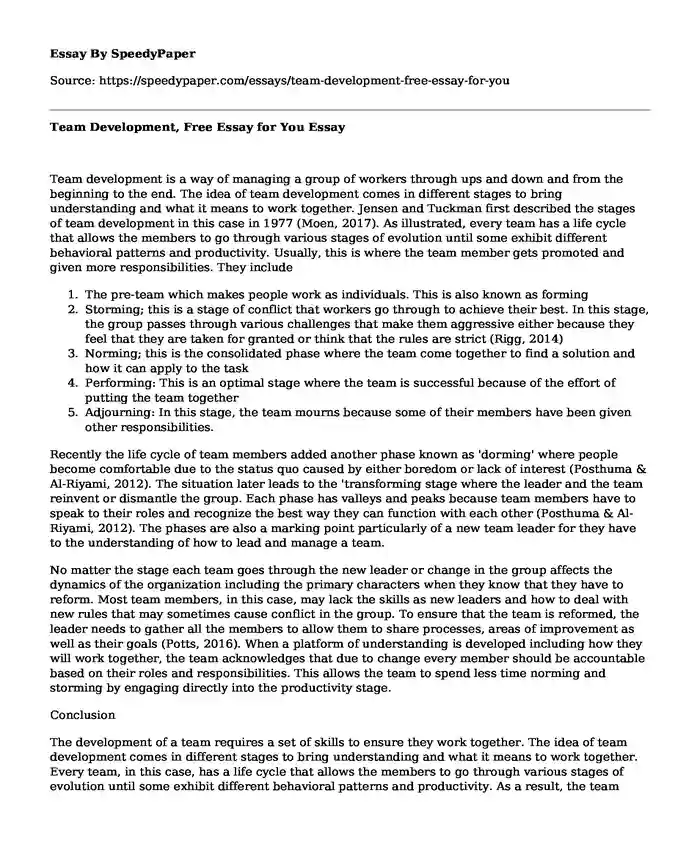
| Type of paper: | Research paper |
| Categories: | Management Human services |
| Pages: | 3 |
| Wordcount: | 647 words |
Team development is a way of managing a group of workers through ups and down and from the beginning to the end. The idea of team development comes in different stages to bring understanding and what it means to work together. Jensen and Tuckman first described the stages of team development in this case in 1977 (Moen, 2017). As illustrated, every team has a life cycle that allows the members to go through various stages of evolution until some exhibit different behavioral patterns and productivity. Usually, this is where the team member gets promoted and given more responsibilities. They include
- The pre-team which makes people work as individuals. This is also known as forming
- Storming; this is a stage of conflict that workers go through to achieve their best. In this stage, the group passes through various challenges that make them aggressive either because they feel that they are taken for granted or think that the rules are strict (Rigg, 2014)
- Norming; this is the consolidated phase where the team come together to find a solution and how it can apply to the task
- Performing: This is an optimal stage where the team is successful because of the effort of putting the team together
- Adjourning: In this stage, the team mourns because some of their members have been given other responsibilities.
Recently the life cycle of team members added another phase known as 'dorming' where people become comfortable due to the status quo caused by either boredom or lack of interest (Posthuma & Al-Riyami, 2012). The situation later leads to the 'transforming stage where the leader and the team reinvent or dismantle the group. Each phase has valleys and peaks because team members have to speak to their roles and recognize the best way they can function with each other (Posthuma & Al-Riyami, 2012). The phases are also a marking point particularly of a new team leader for they have to the understanding of how to lead and manage a team.
No matter the stage each team goes through the new leader or change in the group affects the dynamics of the organization including the primary characters when they know that they have to reform. Most team members, in this case, may lack the skills as new leaders and how to deal with new rules that may sometimes cause conflict in the group. To ensure that the team is reformed, the leader needs to gather all the members to allow them to share processes, areas of improvement as well as their goals (Potts, 2016). When a platform of understanding is developed including how they will work together, the team acknowledges that due to change every member should be accountable based on their roles and responsibilities. This allows the team to spend less time norming and storming by engaging directly into the productivity stage.
Conclusion
The development of a team requires a set of skills to ensure they work together. The idea of team development comes in different stages to bring understanding and what it means to work together. Every team, in this case, has a life cycle that allows the members to go through various stages of evolution until some exhibit different behavioral patterns and productivity. As a result, the team members get promoted and get more responsibilities and so their former leader's responsibilities is to ensure the teamwork together despite that they are also leaders.
References
Moen, J. (2017). Stages of Small-Group Development Revisited by Jensen and Tuckman. Group & Organization Studies, 2(4), 419-427. doi:10.1177/105960117700200404
Posthuma, R., & Al-Riyami, S. (2012). Leading Teams of Higher Education Administrators: Integrating Goal Setting, Team Role, and Team Life Cycle Theories. Higher Education Studies, 2(3). doi:10.5539/hes.v2n3p44
Potts, H. (2016). What Every Leader Needs To Know To Thrive In A New Role. Leader to Leader, 2016(82), 23-29. doi:10.1002/ltl.20257
Rigg, C. (2014). Action Learning for Team and Organization Development. Human Resource Development, 223-253. doi:10.1007/978-1-137-36133-2_11
Cite this page
Team Development, Free Essay for You. (2022, Sep 22). Retrieved from https://speedypaper.com/essays/team-development-free-essay-for-you
Request Removal
If you are the original author of this essay and no longer wish to have it published on the SpeedyPaper website, please click below to request its removal:
- Essay Example on Analysis of the Financial Statements of Unilever Pakistan
- Education Essay Sample on Promoting Learner Autonomy in EAP Courses for Arab Students
- Free Essay Sample on Entrepreneurial Success
- How My Extracurricular Activity Has Shaped Me, Free Essay Sample
- Their Eyes Were Watching God - Tea Cake, Character Analysis Essay Sample
- Essay Sample: Gendered Stereotypes Portray Masculinity Preference and Femininity Dislike
- Essay Example on Amnesia Disorder to Healthy Memory
Popular categories




